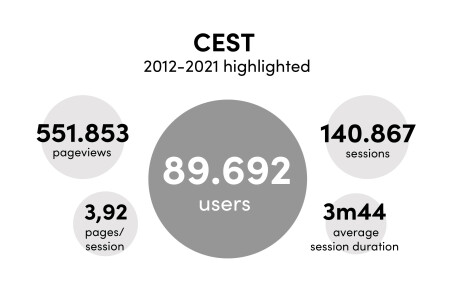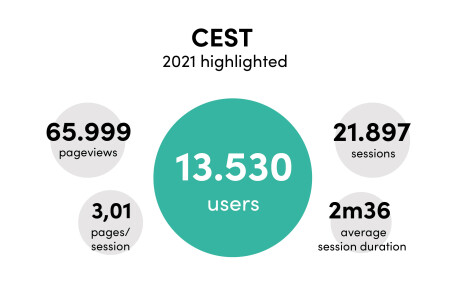CEST unravelled: results of the user survey
27 Jan 2022Since 2010, meemoo has been managing the ‘Cultureel ErfgoedStandaarden Toolbox’ (Cultural Heritage Standards Toolbox): CEST. This online toolbox guides heritage institutions through the maze of standards involved in the creation, management and making accessible of digital collections. The knowledge platform was comprehensively upgraded in 2016, but now it’s time for another update. Find out how we’re going about this and read what steps we’ve already taken here.
At the end of 2009, PACKED (one of meemoo’s predecessors) and e-DAVID (link in Dutch) were commissioned by the Flemish Department of Culture, Youth and Media (link in Dutch) to set up CEST. The aim: to provide clarity about which standards to prioritise when archiving, unlocking and exchanging digital archival, documentary, audiovisual and museum objects and their representations.
CEST was launched in February 2010, and professionals in the heritage sector have been sharing their expertise about the sustainable creation, description, preservation and access to digital heritage on the platform ever since. We’ve continued to develop CEST over this period. In addition to the standards register, we’ve also published guidelines on the best standards for a specific digitisation process, user guides, case studies and project reports, among other things.
The software was updated, searchability was improved, and reuse was enabled by means of an API in 2016. We also enhanced the user-friendliness by adding a WYSIWYG editor.
Issues to resolve
CEST is now ready for another update. We want to optimise the platform to meet the needs of our users even better in 2023. That’s why we’re working on a conceptual initiative this year, to take a close look at our communications strategy on knowledge sharing. Will CEST remain an independent knowledge platform, or will the toolbox become part of the meemoo website?
We started work on exploratory research last year because we want to approach how we update CEST in a well-considered way. We used an online questionnaire, personal interviews and a Google Analytics analysis to map out how users are currently using the knowledge platform, and find out how satisfied they are with it. We can share some initial findings with you now.
Figures to be proud of
Since its launch, CEST has helped almost 90,000 users. Together, they generated more than half a million page visits in over 140,000 sessions. The figures also tell a positive story over a longer period: the numbers of users, sessions and (unique) page visits have all increased dramatically over the last ten years.
In 2021 alone, 13,891 users found their way to the platform, with over 66,000 page visits. The majority of users also visit more than once: the number of sessions (21,897) is much higher than the total number of users. Last year, on average, users clicked through to three pages where they stayed for two and a half minutes.


Achievements and points for attention
In November 2021, 54 CEST users – including a number of meemoo employees – completed our online survey where they answered 28 questions to share their experiences of the knowledge platform. Thirty respondents provided further details and explanations in personal interviews. From their answers, we can conclude that they generally find the knowledge platform to be valuable. The structure, and its coherence and layout in particular, are also appreciated.
The respondents feel that there is still work to be done in terms of its ‘look’, however: the Wiki environment and visual style are not to everyone’s tastes. And the search function and searchability of the content are also points for attention. Noted!
Next steps
We’re going to get to work on the research results internally over the coming months. We will then use our findings as the basis to decide how to update the platform and shape our knowledge-sharing strategy moving forward. You will of course be the first to hear once we’ve worked it all out.
The survey report itself will soon be available on CEST. We hope that our approach will also inspire other organisations.
